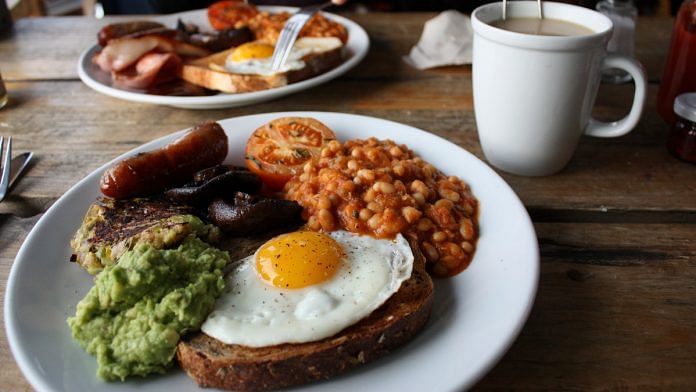Bengaluru: People in their middle age and above who skip breakfast face a higher risk of death by heart disease and strokes, a study conducted on 6,550 Americans has found.
The findings of the research, conducted by scientists at the University of Iowa, pertain to Americans aged 40 to 75 years, and are derived from participants’ food and lifestyle habits between 1988 and 1994. The results were published in the Journal of the American College of Cardiology this week.
Cardiovascular disease is the leading cause of death worldwide, including in India. Over the past few years, several studies have sought to measure the rates of incidence and identify the factors contributing to it.
Quite a few studies have dwelt on the kind of diet a person consumes, but the University of Iowa researchers have described theirs as the first that focuses on the link between breakfast — irrespective of what it constitutes — and heart disease.
The study, however, comes with several caveats, with researchers noting that a person who didn’t consume breakfast was probably likelier to have a poor lifestyle overall. This suggests that the question needs further probing before a definitive result can be offered.
Also read: Being a mom could mean choosing between heart diseases and cancer
Methodology
Breakfast has for years been described as the most important meal of the day, though the proposition has come into question of late.
To understand the link between breakfast and death from heart disease, the University of Iowa obtained data from the National Health and Nutrition Examination Survey (NHANES), a nationwide survey on dietary habits.
The data was for the interval between 1988 and 1994, the only years for which breakfast-habit information was available. They also collected subsequent death data until 2011.
The participants — 48 per cent of them men, and 52 per cent women — were first interviewed and then given a physical exam.
The 6,550 adults were categorised into four frequencies of breakfast consumption: Never (5.1 per cent or 336 participants), rarely (10.9 per cent or 713 people), some days (25 per cent or 1,639 people), and every day (59 per cent or 3,862 participants).
A total of 2,318 study participants died by 2011, of which 619 (26.7 per cent) deaths were from heart disease.
“In a nationally representative cohort with 17 to 23 years of follow-up, skipping breakfast was associated with a significantly increased risk of mortality from cardiovascular disease,” the authors write in the study.
“Our study supports the benefits of eating breakfast in promoting cardiovascular health,” they add.
The study states that skipping breakfast might lead to change in appetites, causing overeating later. According to it, a longer period of fasting — overnight, while asleep, and then through the morning, owing to skipped breakfast — might result in an elevated blood pressure, as well as changes in the body’s cholesterol levels.
Also read: Women’s heart attack symptoms are different, and medicine needs to catch up
Conclusion and caveats
The researchers, however, make it a point to note that the study’s findings should be seen in light of several caveats.
Firstly, the authors say that skipping breakfast is a marker of an unhealthy lifestyle overall.
According to their data, study participants who skipped breakfast were also more likely to be smokers or former smokers, heavier drinkers, unhealthy eaters with low-diet quality, and leading a less active lifestyle.
People who skipped breakfast also tended to be poorer and widowed/divorced, the researchers found.
Those who ate breakfast everyday primarily comprised non-Hispanic whites (those of European descent, as opposed to those of Hispanic or Latino origins), while most non-Hispanic black participants tended to skip breakfast. Hispanic adults were split equally across the four categories.
Non-Hispanic whites are known to have a higher annual income than the other two groups mentioned.
“Participants who never consumed breakfast were more likely to be non-Hispanic black, former smokers, heavy drinkers, unmarried, physically inactive, and with less family income, lower total energy intake, and poorer dietary quality, when compared with those who regularly ate breakfast,” the authors write.
The study also didn’t take into account heart attacks or other episodes of cardiovascular disease where death was prevented. Furthermore, the number of people who ate breakfast everyday was 3,862, while those who skipped it comprised less than a tenth of that number (336).
According to the study, “Compared with those who consumed breakfast every day, participants who never consumed breakfast had a higher risk of heart disease–specific mortality and stroke-specific mortality in models adjusted for age, sex, race/ethnicity.”
However, after accounting for more factors such as socioeconomic and marital status, dietary and lifestyle factors, body mass index, energy intake, and incidence of hypertension and diabetes, the researchers concluded that their “limited evidence” suggested the overall risk of cardiovascular disease was not substantial, while stroke-specific deaths did show a correlation with skipping breakfast.
Also read: Why are so many people getting a meat allergy?



